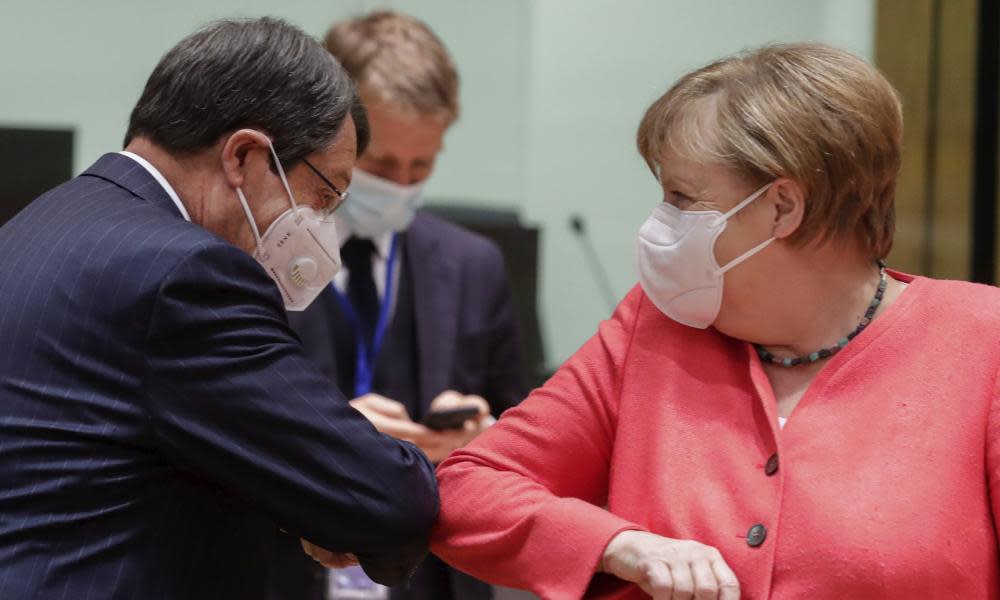Merkel downbeat on chances of deal as EU budget summit begins

EU leaders were poles apart on the terms of a €1.8tn (£1.6tn) budget and recovery package as they met for the first time in five months on Friday, with Angela Merkel warning of the possibility of talks dragging into a second destabilising summer summit.
Spain’s prime minister, Pedro Sánchez, told fellow leaders in Brussels they had an “obligation” to agree on a response to an economic downturn unparalleled since the Great Depression.
His comments were echoed by Italy’s Giuseppe Conte, whose country, like Spain, was among those hit hardest by the coronavirus pandemic and faces a devastating recession.
But EU diplomats said little progress had been made in the first day of what were described as “intense discussions”. “So far the temperature in the room hasn’t substantially risen”, an EU diplomat said. “It seems leaders are preserving their energy for what is to come.” The summit is slated to finish on Saturday but it could run on into Sunday if the negotiations are fruitful, sources said.
The German chancellor, whose country holds the rotating presidency of the EU, offered a notably downbeat assessment about the level of unity among leaders as she arrived in Brussels.
“The differences are still very large and so I can’t predict that we will achieve a result this time,” Merkel said. “It would be desirable, but we also have to be realistic. And it really does take a great deal of willingness to compromise on the part of everyone if we are to achieve something that is good for Europe. In this respect I expect very difficult negotiations.”
Merkel and the French president, Emmanuel Macron, have backed plans to borrow on the capitals markets to fund a €750bn recovery package, but others are at loggerheads over the size of the plan, the terms under which the cash is distributed, and the conditions attached.
There are also major obstacles in getting agreement on the EU’s next seven-year budget, which is due to start next year. The so-called frugal countries of the Netherlands, Austria, Sweden and Denmark are lobbying for less spending but they are also seeking to retain their valuable budget rebates. Denmark’s prime minister, Mette Frederiksen, said she planned to push for cuts to the budget ceiling. “We are not in favour of just spending a lot more money in Brussels,” she said.
The European parliament, however, wants to loosen the purse strings and has threatened to block a proposal from the European council president, Charles Michel, to spend nearly €1.1tn over the seven years, a smaller sum than previously tabled.
Related: No backslapping, no bonhomie? EU summit opens with Covid-19 safeguards
Mark Rutte, the Dutch prime minister, said he believed the chance of finding agreement given the differences was “less than 50%. What’s more, in the end, content is more important than speed. A weak compromise will not take Europe any further.”
Rutte said Hungary’s rejection of any rule-of-law conditions on the distribution of the recovery fund could be “a very big problem”. Hungary’s leader, Viktor Orbán, has threatened to veto any deal that would involve the commission linking the quality of governance at home with a right to EU handouts.
Hungary is facing EU proceedings over claims it has undermined the independence of the country’s judiciary.
A source said that during Friday’s discussions Denmark’s prime minister had been “leading charge on the ceiling and rebates with France demanding the EU to put an end to the rebates. The Netherlands made its case for a new governance mechanism.”

 Yahoo News
Yahoo News 
